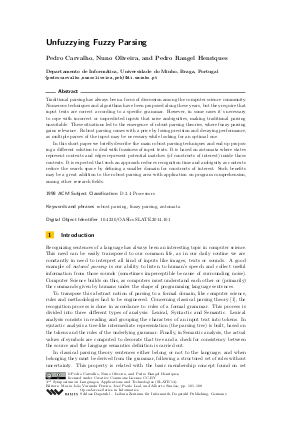Unfuzzying Fuzzy Parsing
Authors Pedro Carvalho, Nuno Oliveira, Pedro Rangel Henriques
-
Part of:
Volume:
3rd Symposium on Languages, Applications and Technologies (SLATE 2014)
Part of: Series: Open Access Series in Informatics (OASIcs)
Part of: Conference: Symposium on Languages, Applications and Technologies (SLATE) - License:
 Creative Commons Attribution 3.0 Unported license
Creative Commons Attribution 3.0 Unported license
- Publication Date: 2014-06-18
File

PDF
OASIcs.SLATE.2014.101.pdf
- Filesize: 466 kB
- 8 pages
Document Identifiers
Subject Classification
Keywords
- robust parsing
- fuzzy parsing
- automata
Metrics
- Access Statistics
-
Total Accesses (updated on a weekly basis)
0PDF Downloads0Metadata Views
Abstract
Traditional parsing has always been a focus of discussion among the computer science community. Numerous techniques and algorithms have been proposed along these years, but they require that input texts are correct according to a specific grammar. However, in some cases it's necessary to cope with incorrect or unpredicted inputs that raise ambiguities, making traditional parsing unsuitable. These situations led to the emergence of robust parsing theories, where fuzzy parsing gains relevance. Robust parsing comes with a price by losing precision and decaying performance, as multiple parses of the input may be necessary while looking for an optimal one. In this short paper we briefly describe the main robust parsing techniques and end up proposing a different solution to deal with fuzziness of input texts. It is based on automata where states represent contexts and edges represent potential matches (of constructs of interest) inside those contexts. It is expected that such an approach reduces recognition time and ambiguity as contexts reduce the search space by defining a smaller domain for constructs of interest. Such benefits may be a great addition to the robust parsing area with application on program comprehension, among other research fields.
Cite As Get BibTex
Pedro Carvalho, Nuno Oliveira, and Pedro Rangel Henriques. Unfuzzying Fuzzy Parsing. In 3rd Symposium on Languages, Applications and Technologies. Open Access Series in Informatics (OASIcs), Volume 38, pp. 101-108, Schloss Dagstuhl – Leibniz-Zentrum für Informatik (2014)
https://doi.org/10.4230/OASIcs.SLATE.2014.101
BibTex
@InProceedings{carvalho_et_al:OASIcs.SLATE.2014.101,
author = {Carvalho, Pedro and Oliveira, Nuno and Henriques, Pedro Rangel},
title = {{Unfuzzying Fuzzy Parsing}},
booktitle = {3rd Symposium on Languages, Applications and Technologies},
pages = {101--108},
series = {Open Access Series in Informatics (OASIcs)},
ISBN = {978-3-939897-68-2},
ISSN = {2190-6807},
year = {2014},
volume = {38},
editor = {Pereira, Maria Jo\~{a}o Varanda and Leal, Jos\'{e} Paulo and Sim\~{o}es, Alberto},
publisher = {Schloss Dagstuhl -- Leibniz-Zentrum f{\"u}r Informatik},
address = {Dagstuhl, Germany},
URL = {https://drops.dagstuhl.de/entities/document/10.4230/OASIcs.SLATE.2014.101},
URN = {urn:nbn:de:0030-drops-45637},
doi = {10.4230/OASIcs.SLATE.2014.101},
annote = {Keywords: robust parsing, fuzzy parsing, automata}
}
